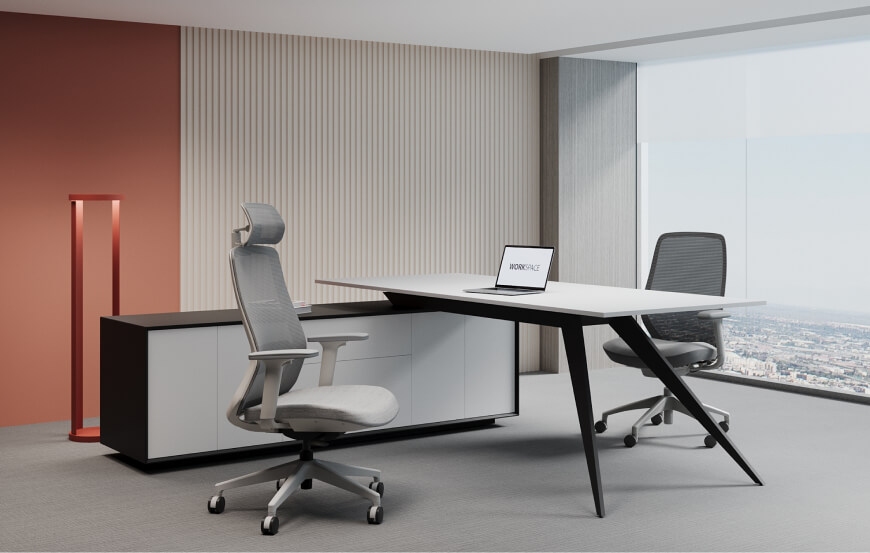
An office desk is a central part of any workspace, serving as the primary area for work, meetings, and organization. Selecting the right office desk can enhance productivity, comfort, and even the aesthetic appeal of an office. This article delves into the importance of Office Desks, various types and styles, and tips on choosing the best desk for your specific needs.
The Importance of a Well-Designed Office Desk
Office desks do more than provide a surface to work on—they contribute to comfort, organization, and efficiency in daily tasks. Here are some of the key benefits of a well-designed office desk:
1. Improved Productivity
A spacious, well-organized desk allows for better workflow, keeping essential tools and materials within reach. With enough surface area and storage options, tasks can be completed more efficiently, boosting productivity.
2. Enhanced Ergonomics
Desks that are designed with ergonomics in mind can help reduce strain on the body. Adjustable desks and those with space for ergonomic accessories (such as keyboard trays and monitor stands) support a healthy posture and reduce fatigue.
3. Better Organization
Office desks with built-in storage and compartments offer organized spaces for files, stationery, and personal items. This minimizes clutter and makes it easier to maintain a neat and orderly workspace.
4. Aesthetic Appeal
A stylish and well-crafted desk can elevate the look of an office. Choosing a desk that matches your office decor adds a professional touch and contributes to an inviting work environment.
Types of Office Desks
There are various types of Office Desks available, each serving different needs and purposes. Here are some popular options:
1. Traditional Desks
Traditional desks are versatile and commonly used for individual workstations. They often include drawers and storage options and come in different shapes, such as rectangular and L-shaped, to suit various office layouts.
2. Standing Desks
Standing desks allow users to switch between sitting and standing positions throughout the day. They are adjustable in height, promoting better posture, circulation, and energy levels by encouraging movement.
3. Executive Desks
Executive desks are larger, more luxurious desks that typically serve as the focal point in executive offices. They often include ample storage, a spacious work surface, and high-quality materials for a professional look.
4. Computer Desks
Computer desks are designed to accommodate computers and related equipment, such as monitors, printers, and keyboards. Many include cable management solutions and keyboard trays for a clean setup.
5. Writing Desks
Writing desks are minimalist desks that provide a simple, uncluttered surface for tasks like writing, reading, and light computer work. They typically lack built-in storage, making them ideal for small spaces.
6. Corner Desks
Corner desks, often L-shaped, are designed to fit into the corner of a room, making efficient use of space. They are a popular choice for home offices and open work areas where space optimization is essential.
Tips for Choosing the Right Office Desk
- Assess Your Needs: Determine how the desk will be used—whether it’s for computer work, meetings, writing, or multi-purpose tasks. This will help narrow down the options.
- Consider Ergonomics: If you’ll be spending long hours at the desk, prioritize ergonomics. Choose desks with adjustable features or enough space to accommodate ergonomic accessories like monitor stands and keyboard trays.
- Select the Right Size: Measure your office space and choose a desk size that fits comfortably without overcrowding. Ensure there’s enough room to move around and add any necessary office equipment.
- Think About Storage: Desks with built-in drawers, shelves, and compartments offer convenient storage solutions, keeping essential items within reach while reducing clutter on the desktop.
- Match Your Office Style: Choose a desk that complements the overall style and decor of your office. Whether your office style is modern, traditional, or minimalist, selecting a desk that aligns with your aesthetics can enhance the office atmosphere.
- Look for Durability: Invest in a desk made from quality materials that can withstand daily use. Desks made of solid wood, metal, or high-grade composite materials tend to be more durable.
Conclusion
Office desks are essential to creating a productive, comfortable, and aesthetically pleasing workspace. By understanding the different types of desks and considering factors like ergonomics, size, and storage, you can find a desk that fits both your practical needs and personal style. An ideal office desk will support your workflow, encourage good posture, and contribute to a well-organized and inviting office environment. Whether you’re setting up a home office or upgrading a corporate workspace, investing in a quality office desk can have a lasting positive impact on your work experience and efficiency.
